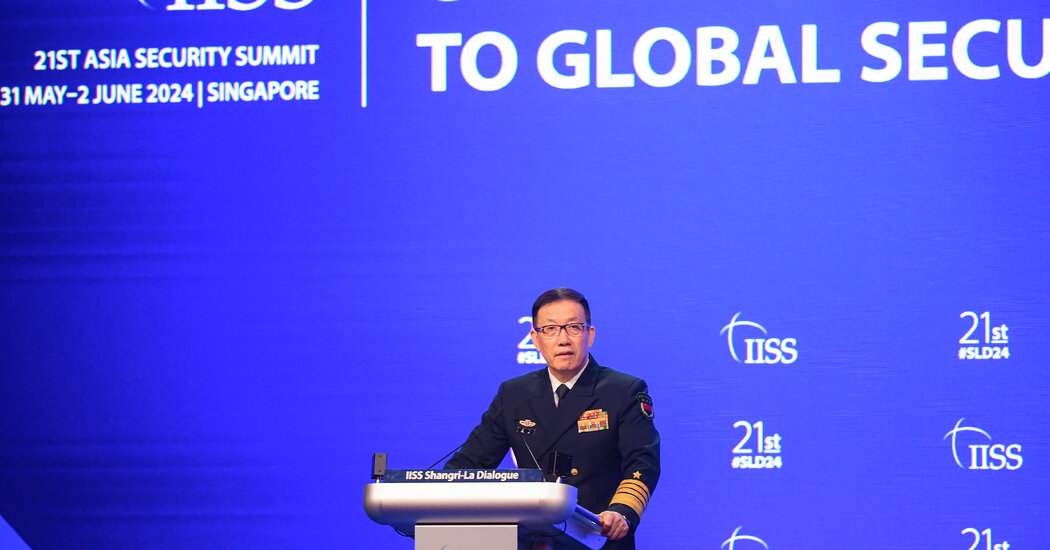Competing strains on U.S. global power emerged at a security conference Sunday, where China accused the United States of stoking tensions around Taiwan and in the South China Sea, and Ukrainian President Volodymyr Zelensky sought greater support for his country in difficulty.
These scenes played out at the Shangri-La Dialogue, an annual security forum in Singapore that has long been a barometer of the highs and lows of U.S.-China relations.
This year, US Defense Secretary Lloyd J. Austin III and Chinese Defense Minister Admiral Dong Jun held talks, something the two countries' top defense officials have not always done in this meeting. But Admiral Dong made clear that China remains antagonistic to U.S. influence and alliance-building across Asia, particularly American support for Taiwan, the democratic island that Beijing claims as its territory.
“These malign intentions are leading Taiwan toward the dangers of war,” Admiral Dong said during the meeting after making an indirect but unambiguous reference to U.S. military and political support for Taiwan. “Anyone who dares to separate Taiwan from China will be torn to pieces and seek their own destruction.”
Admiral Dong's warnings and other combative comments from Chinese military officials at the meeting reflect how far apart Beijing and Washington remain on key issues, even as they debate how to prevent military frictions at sea and in the air from escalating into a crisis.
Last month, China held two days of menacing military exercises around Taiwan, accusing its new president, Lai Ching-te, of trying to promote the island's independence. Lai has said he wants to preserve Taiwan's ambiguous status quo – self-governed, but far from full formal independence – but Chinese officials describe this as a threat to Beijing's claims to the island.
“I think it was essentially a step towards Taiwan's independence,” Lt. Gen. He Lei, former vice president of the Chinese Academy of Military Sciences, said of Mr. Lai's inaugural speech last month. “As long as he continues further and further down the road to Taiwan independence, going deeper and deeper, the dangers in the Taiwan Strait will only increase.”
Wen Lii, a spokeswoman for the Taiwanese president, said comments by Chinese officials in Singapore “willfully distorted” Taiwan's position and that recent People's Liberation Army exercises sent “a dangerous and irresponsible message.”
Austin warned in a speech on Saturday against “actions in this region that erode the status quo and threaten peace and stability,” an indirect reference to Chinese pressure on Taiwan. Austin also said that “we all share an interest in ensuring that the South China Sea remains open and free.”
But Admiral Dong accused an unnamed Southeast Asian country – clearly the Philippines – of fomenting trouble on disputed islands and shallows, and again suggested that the real culprit was the United States.
“A certain country, incited by external forces, abandoned bilateral agreements, broke its promises and took premeditated actions to foment incidents,” he said in his speech to diplomats, military officers and experts, many of them from countries Asians. “China has exercised sufficient restraint in responding to these provocations, but this restraint has its limits.”
The Philippines is at odds with China over their rival claims in the South China Sea, in an area Manila calls the West Philippine Sea. In 2016, an international tribunal under the United Nations Convention on the Law of the Sea rejected China's expansive claims in the South China Sea, which included shoals near the Philippines. Beijing ignored that ruling.
During the meeting in Singapore, Philippine President Ferdinand Marcos Jr. warned on Friday that his government could seek U.S. support under a mutual defense treaty if a Chinese vessel caused the deaths of a Filipino sailor.
A U.S. official who listened to Admiral Dong's speech took issue with his portrayal of China as an innocent victim of regional disputes. The official, speaking on condition of anonymity to discuss geopolitical tensions, said the admiral's statement was at odds with the Chinese military's “coercive activity” in the region.
Singapore, Austin and other Western officials were also reminded that Ukraine's more than two-year war against Russian invasion continues to demand the attention of their leaders and the resources of their taxpayers.
Mr. Zelensky, a last-minute addition to the meeting, met on Sunday with Mr. Austin, who provided an update on U.S. security assistance, according to a Pentagon readout of the meeting. Then Mr. Zelensky spoke at the conference.
There is still no clear evidence that Ukraine has struck inside Russia with weapons supplied by its NATO allies, after the Biden administration agreed last week to the Kiev government's request to be able to strike targets across the border . This change in US policy had followed declarations by nearly a dozen European governments and Canada that their weapons could be used in this way.
Nonetheless, Russian regional authorities said Sunday that a barrage of near-daily artillery attacks from Ukraine had continued.
Before giving a speech promoting a peace summit on Ukraine in Switzerland next month, which Zelensky said officials from 106 countries had agreed to join, he was greeted with loud applause. He appealed to Indo-Pacific leaders to support the meeting with their participation or ideas, adding that only tenacious diplomacy could end the conflict.
“The world must be resilient; it must be strong; must put pressure on Russia,” he told the assembly. “There is no other way to stop Putin.”
At a later news conference, Zelensky told reporters that Russia had persuaded China to try to help limit Asian participation. He provided no details; China's Foreign Ministry did not immediately respond to the accusation. He also said that Chinese economic and technological flows to Russia are helping it wage war. The Chinese government has repeatedly denied sending weapons to Russia.
On Sunday, Russian forces continued to strike front-line areas of Ukraine, which is fighting to repel an offensive by Moscow that has gathered pace in recent weeks.
Matthew Mpoke Bigg contributed reporting from London.





